Related Research Articles

The Bee Gees were a musical group formed in 1958 by brothers Barry, Robin, and Maurice Gibb. The trio were especially successful in popular music in the late 1960s and early 1970s, and later as prominent performers in the disco music era in the mid-to-late 1970s. The group sang recognisable three-part tight harmonies: Robin's clear vibrato lead vocals were a hallmark of their earlier hits, while Barry's R&B falsetto became their signature sound during the mid-to-late 1970s and 1980s. The group wrote all their own original material, as well as writing and producing several major hits for other artists, and are regarded as one of the most important and influential acts in pop-music history. They have been referred to in the media as The Disco Kings, Britain's First Family of Harmony, and The Kings of Dance Music.

Maurice Ernest Gibb was a British musician and songwriter. He achieved worldwide fame as a member of the pop group Bee Gees. Although his elder brother Barry Gibb and twin brother Robin Gibb were the group's main lead singers, most of their albums included at least one or two songs featuring Maurice's lead vocals, including "Lay It on Me", "Country Woman" and "On Time". The Bee Gees are one of the most successful pop-rock groups of all time.

Cucumber Castle is the seventh studio album by the Bee Gees, released in April 1970. It was produced by Barry Gibb, Maurice Gibb, and Robert Stigwood. It consists of songs from their television special of the same name, which was named after a song on their 1967 album Bee Gees' 1st. Cucumber Castle is the only Bee Gees album not to feature any recorded contributions from Robin Gibb, as he had left the group before the album was recorded.

Trafalgar is a 1971 album by the Bee Gees. It was their ninth album, and was released in September 1971 in the US, and November 1971 in the UK. The album was a moderate hit in the United States, and peaked at No. 34. The lead single "How Can You Mend a Broken Heart?" was the first Bee Gees' No. 1 single in the United States but failed to chart in Britain as did the album. It is Geoff Bridgford's only full-length appearance on a Bee Gees album as an official member.
Stephen Alan Kipner is an American-born Australian songwriter and record producer, with hits spanning a 40-year period, including chart-topping songs such as Olivia Newton-John's "Physical", Natasha Bedingfield's "These Words", and Christina Aguilera's "Genie in a Bottle", for which he won an Ivor Novello Award for International Hit of the Year. Other hits he has writing credits on include Chicago's "Hard Habit to Break", 98 Degrees' "The Hardest Thing", Dream's "He Loves U Not", Kelly Rowland's "Stole", The Script's "Breakeven" and "The Man Who Can't Be Moved", American Idol Kris Allen's top 5 debut "Live Like We're Dying", Cheryl Cole's "Fight for This Love", Camila Cabello's "Crying in the Club" and James Arthur's "Say You Won't Let Go".

Tin Tin was a pop rock band, which first formed in Australia as the Kinetics in 1966. They relocated to the United Kingdom in 1969 and were renamed as Tin Tin, which comprised Steve Kipner, Steve Groves, John Vallins and Geoff Bridgford (drums). In 1970 they issued a single, "Toast and Marmalade for Tea", which was a No. 10 hit on the Go-Set National Singles Chart in June the following year. It also reached No. 20 in the United States on the Billboard Hot 100. Their next single, "Is That the Way?" (1971), peaked at No. 59 on the Billboard Hot 100.
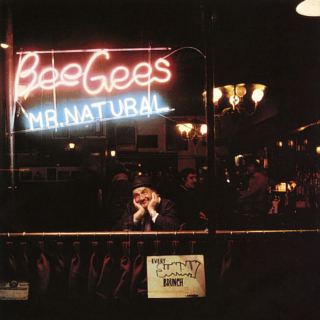
Mr. Natural is the twelfth studio album by the Bee Gees, released in 1974. It was the first Bee Gees release produced by Arif Mardin, who was partially responsible for launching the group's later major success with the follow-up album Main Course. The album's rhythm and blues, soul, funk, and hard rock sounds initiated the group's reinvention as a disco and blue-eyed soul act, which would solidify on subsequent albums. However, Barry Gibb has said that the album was "whiter" than Main Course. The cover photograph was taken at 334 West 4th Street, Greenwich Village, New York City by Frank Moscati, which is today known as The Corner Bistro tavern.
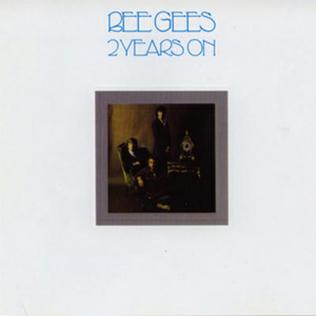
2 Years On is the eighth studio album by the Bee Gees, which reached No. 32 on the US charts. Released in 1970, the album saw the return of Robin Gibb to the group after an earlier disagreement and subsequent split following Odessa. 2 Years On was the first album with drummer Geoff Bridgford, who remained a full-time member of the group until 1972 although he was not pictured on the sleeve. The best-known track is "Lonely Days". Released as the first single by the reunited brothers, it charted high in the US, but only reached No. 33 in the United Kingdom.

To Whom It May Concern is the tenth album by the Bee Gees. Released in October 1972, it is the follow-up to, and continues the melancholic and personal sound of its predecessor, Trafalgar. The album was recognised as "a farewell to the old Bee Gees" as the album marked the end of an era for the group in several ways: it was their last album to be recorded solely at IBC Studios, in London, their last with conductor and arranger Bill Shepherd, who had guided them since 1967, and their last under their first contract with Robert Stigwood. Some of the songs were old ones finished or rewritten for the occasion.
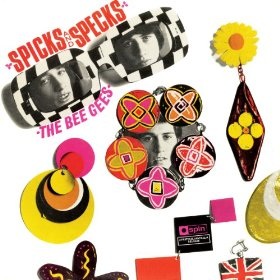
Spicks and Specks is the second studio album by the Bee Gees. It was released in November 1966, on Spin. Primarily written by Barry Gibb, the album includes the first Robin Gibb composition "I Don't Know Why I Bother With Myself" and a Maurice Gibb composition "Where Are You".

"How Can You Mend a Broken Heart" is a song released by the Bee Gees in 1971. It was written by Barry and Robin Gibb and was the first single on the group's 1971 album Trafalgar. It was their first US No. 1 single and also reached No. 1 in Cashbox magazine for two weeks.
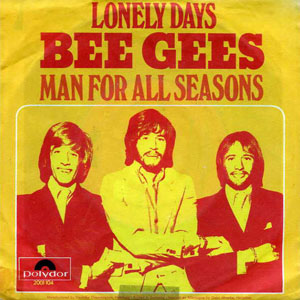
"Lonely Days" is a ballad written and performed by the Bee Gees. It appeared on their album 2 Years On, and was released as a single, becoming their first Top Five hit in the US, peaking at number three in the Billboard Hot 100 and reaching number one in the Cashbox and Record World charts. Barry Gibb later re-recorded the song with country quartet Little Big Town for his 2021 album Greenfields.

Frederick Colin Petersen was an Australian drummer, record producer and child actor. He played as a member of the bands Steve and the Board, the Bee Gees and Humpy Bong. In August 1969, he left the Bee Gees and he was replaced by Pentangle drummer Terry Cox to record the songs for their 1970 album Cucumber Castle. His scenes from the film of the same name were cut, and he is not credited on the accompanying album soundtrack, even though he does play on some songs.
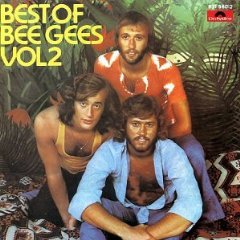
Best of Bee Gees Vol. 2 is a compilation album of hits by the Bee Gees released in 1973. The album, briefly revived on CD in the late 1980s, went out of print, but was reissued by Rhino in November 2008.

"My World" is a 1972 single released by the Bee Gees. It was originally released as a non-album single on 14 January 1972 worldwide. but was later included on the compilation Best of Bee Gees, Volume 2 in 1973. The flip side of the single was "On Time", a country rock number composed by Maurice Gibb. "My World" reached the Top 20 in both US and UK.
"Alive" is a ballad recorded by the Bee Gees for their album To Whom It May Concern. It was the second and last single from the album released on 10 November 1972 worldwide. The song was credited to Barry and Maurice Gibb and produced by the Gibbs and their manager Robert Stigwood.
"On Time" is a song written by Maurice Gibb and recorded by the Bee Gees released on 14 January 1972 as the B-side of the single "My World".
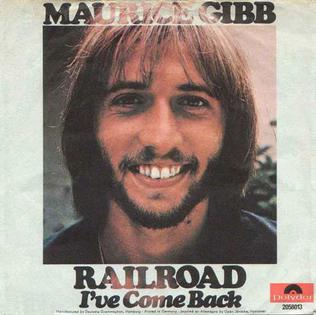
"Railroad" is the first solo single released by Maurice Gibb, best known as a member of the Bee Gees. It was released in April 1970. Like the Bee Gees' songs from 1967 to 1972, the single was released by Polydor in most parts of the world while in the US and Canada it was released by Atco. In Canada it was also released by Atlantic and Cotillion. Gibb did not release a follow-up single until 1984 when he released "Hold Her in Your Hand".
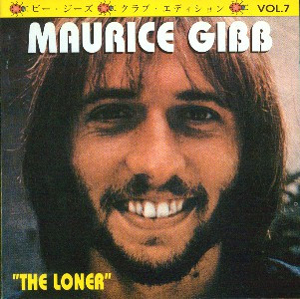
The Loner is an album recorded in late 1969 by Maurice Gibb of the Bee Gees. An album master was compiled on 14 November 1970, but to date The Loner remains unreleased. Bootleg releases with the same title collect additional recordings unrelated to this album.
The Fut were a short-lived rock group formed in London in 1969, consisting of Maurice Gibb, Steve Groves, Steve Kipner and Billy Lawrie. Their only single was "Have You Heard the Word", released in the UK on Beacon Records. This was the first time since the formation of the Bee Gees that Gibb, who was still in the group, had performed with another group. Groves and Kipner were members of the group Tin Tin.
References
- 1 2 3 4 5 6 7 "Geoff Bridgford: Beyond the Bee Gees". The Strange Brew. Retrieved 2024-11-18.
- 1 2 3 "MILESAGO - Groups & Solo Artists - Spectrum / Indelible Murtceps". www.milesago.com. Retrieved 2024-11-18.
- ↑ "Whammo Homepage". web.archive.org. 2004-08-03. Retrieved 2024-11-18.
- ↑ "MILESAGO - Groups & Solo Artists - The Groove". www.milesago.com. Retrieved 2024-11-18.
- ↑ Note: Used for Australian Singles and Albums charting from 1974 until ARIA created their own charts in mid-1988. In 1992, Kent back calculated chart positions for 1970–1974.
- ↑ Note: Chart positions back calculated by Kent in 2005.
- ↑ Kent, David Martin. "The place of Go-Set in rock and pop music culture in Australia, 1966 to 1974" (PDF). 12 & 13. Retrieved 2024-11-18.
- ↑ "RPM Top 100 Singles – May 29, 1971" (PDF). 1971-05-29. Retrieved 2024-11-18.
- ↑ "1969: Gibb Songs" . Retrieved 2024-11-18.
- ↑ "The 10 best Bee Gees songs of all time". faroutmagazine.co.uk. 2021-09-01. Retrieved 2024-11-18.
- ↑ spirits79 (2013-05-06). "Bee Gees And Geoff Bridgford". Bee Gees BR (in Brazilian Portuguese). Retrieved 2024-11-18.
{{cite web}}: CS1 maint: numeric names: authors list (link) - ↑ Kimbo (2016-10-07). "HISTORY OF AUSTRALIAN MUSIC FROM 1960 UNTIL 2000: GEOFF BRIDGFORD". HISTORY OF AUSTRALIAN MUSIC FROM 1960 UNTIL 2000. Retrieved 2024-11-18.
- ↑ Fiona. "Bridgford, Geoff" . Retrieved 2024-11-18.